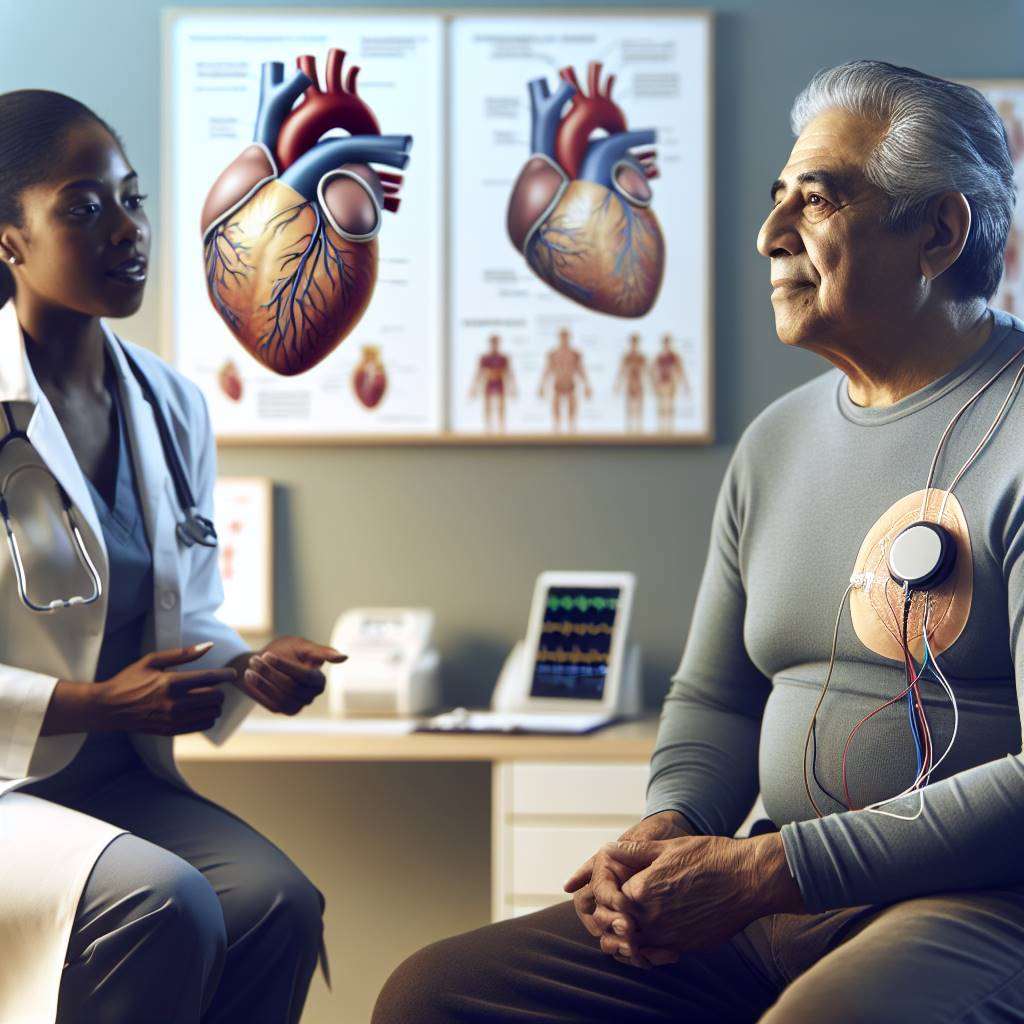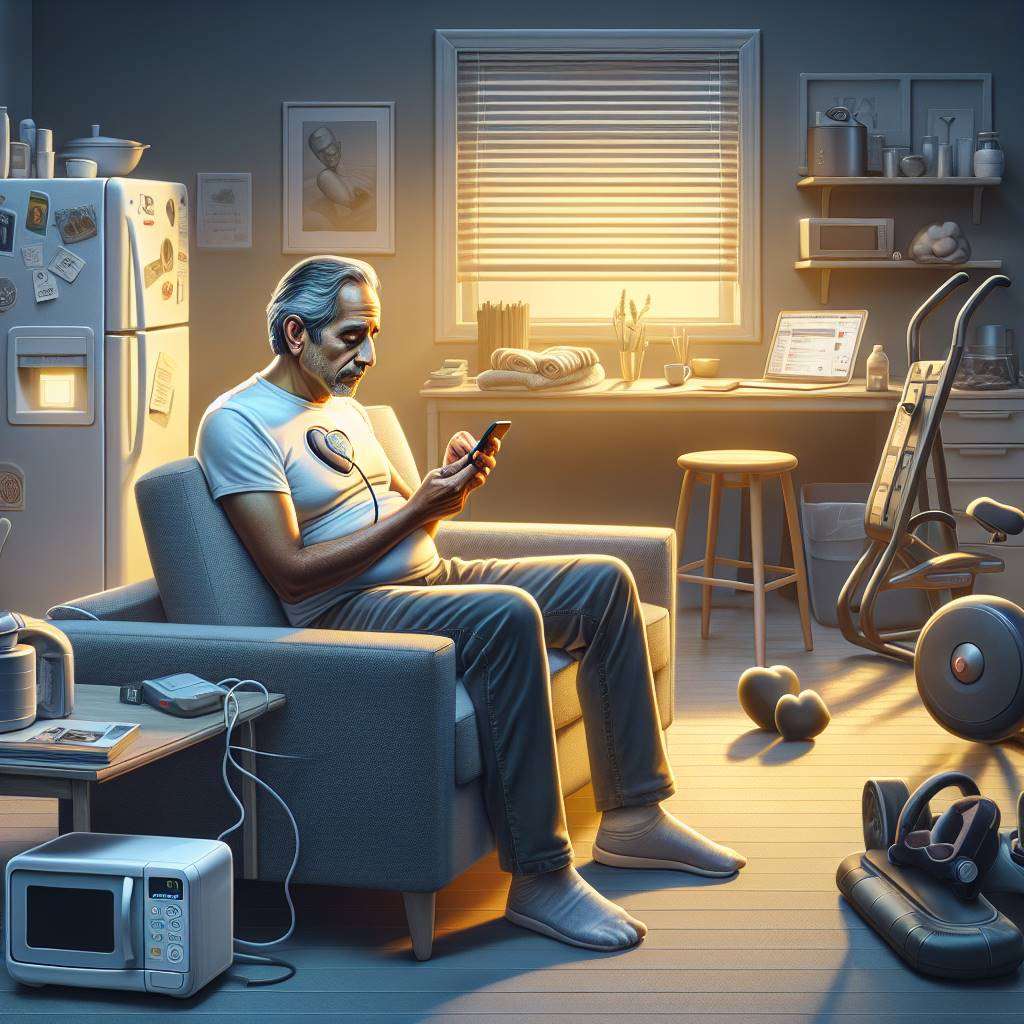Living with a pacemaker can significantly improve the quality of life for individuals with heart rhythm disorders. This small device helps regulate your heartbeat, ensuring it stays within a healthy range. However, understanding the activities you can and cannot do is crucial to maintaining your health and avoiding complications.
Medical disclaimer: This content is for general awareness and does not replace a doctor’s consultation. For diagnosis or treatment decisions, consult a qualified specialist.
While a pacemaker allows you to lead a relatively normal life, there are certain precautions to follow. Knowing which physical activities are safe and which restrictions to observe can help you adapt to life with this device. This guide provides essential insights for patients and caregivers to ensure a smooth transition to living with a pacemaker.
What to Expect When Living With a Pacemaker
A pacemaker is a medical device implanted under the skin to help manage irregular heartbeats, also known as arrhythmias. After the procedure, most patients experience improved energy levels and reduced symptoms like fatigue or dizziness. However, adjusting to life with a pacemaker requires some understanding of its functionality and limitations.
Initially, you may feel some discomfort at the implantation site, but this typically subsides within a few weeks. Regular follow-ups with your cardiologist are essential to monitor the device's performance and ensure it is functioning correctly. Modern pacemakers are highly reliable and designed to last several years, but they may require periodic adjustments or battery replacements.
It's important to avoid exposure to strong electromagnetic fields, as they can interfere with the pacemaker's operation. Discussing your lifestyle and specific health needs with your doctor will help you better understand what to expect and how to manage your condition effectively.

Safe Physical Activities for Pacemaker Patients
Engaging in physical activity is not only safe but also beneficial for most pacemaker patients. Light to moderate exercises like walking, swimming, and yoga can improve cardiovascular health and overall well-being. However, it is essential to consult your doctor before starting any new exercise routine.
Avoid high-impact sports or activities that involve heavy lifting, as these can strain the chest area where the pacemaker is implanted. Activities like golf or cycling are generally safe, but you should always listen to your body and stop if you feel discomfort or fatigue.
- Walking and jogging at a moderate pace
- Stretching and flexibility exercises
- Low-intensity swimming
- Gentle yoga or tai chi
Remember, the goal is to stay active without overexerting yourself. Regular physical activity can help maintain a healthy heart and improve your quality of life with a pacemaker.
Can You Exercise With a Pacemaker? Find Out
Yes, you can exercise with a pacemaker, but it is important to follow specific guidelines to ensure safety. Exercise helps strengthen your heart and improve circulation, but you must avoid activities that could dislodge or damage the device.
Start with low-impact exercises and gradually increase intensity under medical supervision. Avoid contact sports like football or boxing, as these can pose a risk to the pacemaker site. Additionally, exercises that involve repetitive arm movements above the shoulder, such as certain weightlifting routines, should be avoided during the initial recovery phase.
Always warm up before exercising and cool down afterward to prevent sudden strain on your heart. If you experience symptoms like dizziness, chest pain, or shortness of breath during exercise, stop immediately and consult your doctor. With proper precautions, exercise can be a safe and effective way to stay healthy with a pacemaker.
Everyday Activities You Can Do With a Pacemaker
Living with a pacemaker does not mean giving up your daily activities. Most routine tasks, such as cooking, cleaning, and driving, are completely safe. You can also use household appliances like microwaves and televisions without worrying about interference with your device.
Traveling is generally safe for pacemaker patients, but you should carry your pacemaker ID card and inform airport security about your device. Metal detectors and security scanners are unlikely to harm your pacemaker, but it’s best to avoid prolonged exposure.
Maintaining a balanced lifestyle is key. Enjoy hobbies, spend time with loved ones, and engage in activities that bring you joy. Always consult your doctor if you are unsure about specific activities or have concerns about your pacemaker.
Understanding Restrictions After Getting a Pacemaker
While a pacemaker allows you to live a normal life, there are certain restrictions to keep in mind. For instance, avoid placing electronic devices like mobile phones or headphones directly over the pacemaker site, as they may interfere with its function. Keep such devices at least 15 cm away from the device.
Heavy lifting and strenuous activities should be avoided during the initial recovery period, typically 4–6 weeks after implantation. Additionally, exposure to high-voltage machinery or strong magnetic fields, such as MRI machines, should be limited unless specifically cleared by your doctor.
| Activity |
Safe or Restricted |
| Using household appliances |
Safe |
| Contact sports |
Restricted |
| Driving |
Safe (after recovery) |
| MRI scans |
Restricted (unless MRI-compatible pacemaker) |
By understanding these restrictions and following your doctor’s advice, you can minimize risks and enjoy a fulfilling life with a pacemaker.
Is It Safe to Travel With a Pacemaker?
Traveling with a pacemaker is generally safe, but it requires some precautions. If you have a pacemaker, you should always carry your pacemaker identification card while traveling. This card provides essential information about your device and can help in emergencies.
When passing through airport security, inform the staff about your pacemaker. Avoid walking through metal detectors as they may interfere with the device. Instead, request a manual pat-down or use alternative screening methods. Additionally, keep your travel medications and emergency contact information handy.
Before traveling, consult your cardiologist to ensure your health is stable. Long flights or journeys may increase the risk of blood clots, so stay hydrated and move around periodically. With proper planning, you can enjoy safe and stress-free travel.

Using Electronic Devices Around a Pacemaker: Guidelines
Electronic devices can sometimes interfere with pacemakers, but most modern devices are safe to use with proper precautions. For example, mobile phones should be kept at least 15 cm (6 inches) away from your pacemaker. Avoid placing your phone in a shirt pocket near the device.
Household appliances like microwaves, televisions, and refrigerators are generally safe. However, high-powered tools or industrial equipment may pose risks. Always check the manufacturer's guidelines for compatibility with pacemakers.
If you experience symptoms like dizziness or irregular heartbeats while using an electronic device, stop using it immediately and consult your doctor. Following these guidelines can help you use electronics safely without compromising your heart health.
Sports and Fitness Tips for Pacemaker Patients
Staying active is important for overall health, even if you have a pacemaker. However, certain activities should be approached with caution. Low-impact exercises like walking, yoga, and swimming are generally safe and beneficial for heart health.
High-impact sports or activities involving heavy lifting may strain the chest area and should be avoided unless approved by your cardiologist. Always start with light exercises and gradually increase intensity under medical supervision.
- Warm up before exercising to prepare your body.
- Stay hydrated and avoid overexertion.
- Listen to your body and stop if you feel discomfort.
Regular physical activity can improve your quality of life, but it’s essential to follow your doctor’s advice to ensure safety.
Household Chores You Can Safely Do With a Pacemaker
Most household chores are safe for individuals with a pacemaker. Activities like cooking, cleaning, and gardening can be performed without any issues. However, avoid tasks that involve heavy lifting or prolonged overhead movements, as these may strain the chest area.
Using household appliances such as vacuum cleaners, washing machines, and microwaves is generally safe. Ensure that any electrical equipment is in good condition to avoid potential interference with your pacemaker.
If you feel fatigued or experience symptoms like dizziness while performing chores, take a break and consult your doctor. Maintaining a balance between activity and rest is crucial for your overall well-being.
Swimming, Running, and Other Activities With a Pacemaker
Engaging in physical activities like swimming and running is possible with a pacemaker, but it’s important to follow your doctor’s recommendations. Swimming is a low-impact exercise that is gentle on the joints and promotes cardiovascular health. Ensure your incision site is fully healed before entering the water.
Running and jogging can also be safe, but start with shorter distances and gradually increase intensity. Avoid contact sports or activities that may involve direct impact to the chest area, as this could damage the pacemaker.
Consult your cardiologist before starting any new exercise routine. With proper guidance, you can enjoy an active lifestyle while keeping your heart healthy.
What Pacemaker Patients Should Avoid Doing
Living with a pacemaker requires some adjustments to your daily routine. Certain activities and environments can interfere with the device's function. For example, you should avoid prolonged exposure to strong magnetic fields, such as those from MRI machines or industrial equipment.
Additionally, high-impact sports like boxing or rugby should be avoided as they can damage the pacemaker or its leads. It's also important to steer clear of devices like anti-theft systems or metal detectors for extended periods. Always consult your doctor before engaging in activities that may pose risks to your heart health.

How to Stay Active and Healthy With a Pacemaker
Staying active is essential for maintaining overall cardiovascular health, even with a pacemaker. Light to moderate exercises like walking, swimming, or yoga are generally safe and beneficial. These activities help improve circulation and strengthen your heart without putting undue stress on your pacemaker.
However, always follow your doctor’s advice regarding exercise intensity and duration. Avoid activities that involve heavy lifting or repetitive arm movements above the shoulder, as these can strain the pacemaker leads. Remember to warm up before exercising and cool down afterward to prevent sudden changes in heart rate.
- Choose low-impact exercises like cycling or tai chi.
- Monitor your heart rate during workouts.
- Stay hydrated and avoid overexertion.
Can You Drive With a Pacemaker? Key Considerations
Yes, most people with a pacemaker can drive safely after recovery. However, there are some important considerations. After implantation, your doctor may recommend avoiding driving for a few weeks to ensure the device is functioning properly and to allow your body to heal.
If you experience symptoms like dizziness, fainting, or irregular heartbeats, it’s crucial to avoid driving until these issues are resolved. Always inform your doctor about such symptoms, as they may indicate a problem with your pacemaker.
For professional drivers, additional medical evaluations may be required to ensure safety. Always carry your pacemaker ID card, as it provides essential information in case of emergencies.
Workplace Safety Tips for People With Pacemakers
Returning to work with a pacemaker is possible for most individuals, but certain precautions are necessary. If your job involves exposure to strong electromagnetic fields, such as in welding or working near high-voltage equipment, consult your doctor about potential risks.
Maintain a safe distance from equipment like power tools or industrial machinery that could interfere with your pacemaker. Inform your employer about your condition so they can make necessary accommodations, if required.
| Workplace Item |
Safe Distance |
| Microwaves |
At least 30 cm |
| Power Tools |
At least 60 cm |
| High-Voltage Equipment |
Consult your doctor |
Living a Full Life With a Pacemaker: Do’s and Don’ts
Having a pacemaker doesn’t mean you can’t enjoy life. Focus on the do’s: maintain a healthy diet, stay active, and attend regular follow-ups with your cardiologist. These steps ensure your pacemaker functions optimally and supports your overall health.
On the other hand, avoid the don’ts: don’t skip medical appointments, don’t expose yourself to strong magnetic fields, and don’t ignore symptoms like dizziness or chest pain. These could indicate issues with your pacemaker or underlying heart conditions.
By following these guidelines and staying informed, you can lead a fulfilling life while managing your heart health effectively.
Best Pacemaker Surgery Doctors in India
Two of the most reputed doctors for pacemaker implantation in India are Dr. Balbir Singh, Chairman of Cardiology at Medanta - The Medicity, Gurugram, with over 30 years of experience, and Dr. Ashok Seth, Chairman of Fortis Escorts Heart Institute, New Delhi, with extensive expertise in interventional cardiology and global recognition for his contributions.
Learn more on best pacemaker implantation surgery doctors in india
Best Pacemaker Surgery Hospitals in India
Leading hospitals for pacemaker implantation in India include Fortis Escorts Heart Institute, New Delhi, known for its advanced cardiac care and multidisciplinary approach, and Medanta - The Medicity, Gurugram, offering state-of-the-art technology and robotic-assisted procedures. Both hospitals are NABH and JCI accredited and provide excellent international patient services.
Find more best pacemaker implantation surgery hospitals in india
Pacemaker Surgery Cost in India
The cost of pacemaker implantation in India typically ranges from INR 2,00,000 to 5,00,000 (approximately USD 2,500 to 6,000). Factors influencing costs include the type of pacemaker, hospital category, and doctor’s expertise. The average hospital stay is around 2-3 days. India offers a significant cost advantage compared to Western countries, with options for insurance coverage and third-party financing.
Learn pacemaker implantation surgery cost in india
Pacemaker Surgery Treatment in India
Pacemaker implantation in India involves placing a small device under the skin to regulate heart rhythms. The procedure is typically performed under local anesthesia using minimally invasive techniques. Advanced technologies like leadless pacemakers and robotic-assisted implantation are available. Recovery usually takes 1-2 weeks. Indian hospitals adhere to global medical protocols and offer innovative solutions for better outcomes.
Learn on Pacemaker Surgery Treatment in India
FAQs
Can I exercise with a pacemaker?
Yes, most individuals with a pacemaker can engage in moderate exercise after consulting their doctor. Avoid high-impact activities that may strain the chest area or involve direct trauma.
Will I feel the pacemaker inside my body?
Initially, you may feel some discomfort or awareness of the pacemaker. Over time, most patients adapt and do not notice it during daily activities.
Can I use electronic devices with a pacemaker?
Most household electronic devices are safe. However, avoid prolonged exposure to strong electromagnetic fields, such as those from industrial equipment or MRI machines, unless cleared by your doctor.
How often does a pacemaker need to be checked?
A pacemaker is typically checked every 6-12 months. Remote monitoring may also be available, depending on the device model.
What is the lifespan of a pacemaker?
The battery life of a pacemaker usually ranges from 5 to 15 years, depending on usage and device type. Replacement involves a minor procedure.
Can I travel with a pacemaker?
Yes, you can travel with a pacemaker. Carry your pacemaker ID card and inform security personnel at airports to avoid metal detectors.
Are there any dietary restrictions with a pacemaker?
There are no specific dietary restrictions for individuals with a pacemaker. However, maintaining a heart-healthy diet is recommended.
Can I drive after getting a pacemaker?
Driving is usually allowed after a brief recovery period, but it is essential to follow your doctor’s advice based on your condition.
What happens if the pacemaker malfunctions?
If a pacemaker malfunctions, symptoms like dizziness or irregular heartbeats may occur. Seek immediate medical attention to address the issue.
Is pacemaker implantation a permanent solution?
A pacemaker helps manage heart rhythm issues but does not cure the underlying condition. Regular follow-ups are necessary to ensure optimal functioning.
Understanding Pacemakers: Types and Their Effects on Sleep
Pacemakers are vital devices for managing heart rhythm disorders, but many patients are often unsure about the differences between the types available. For instance, a detailed comparison of single-chamber and dual-chamber pacemakers reveals how each type functions and the specific conditions they address. Understanding these differences can help patients make informed decisions about their heart health.
Moreover, the impact of pacemakers extends beyond heart function; they can significantly influence sleep quality and management of sleep apnea. Research shows that patients with pacemakers may experience changes in their sleep patterns, which can be crucial for overall health. For insights into how pacemakers affect sleep and assist in sleep apnea management, it’s essential to consider both the physiological and psychological aspects of living with a pacemaker.
In conclusion, understanding the types of pacemakers and their effects on sleep can empower patients to better manage their health and improve their quality of life.